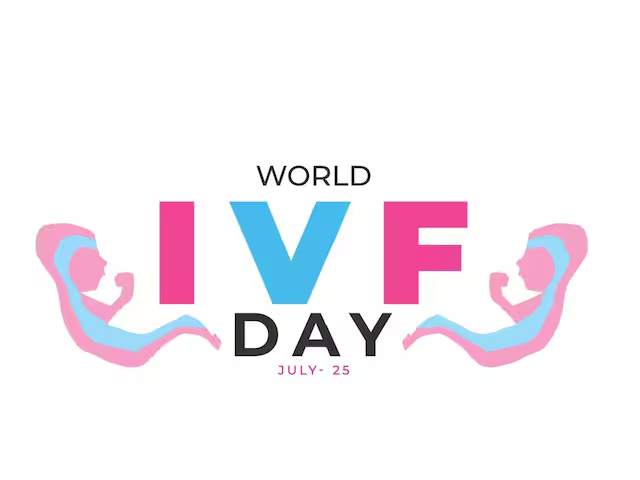July 25th marks World IVF Day 2024, a day dedicated to raising awareness and understanding about In Vitro Fertilization (IVF) and the challenges faced by individuals and couples dealing with infertility. This observance plays a critical role in destigmatizing infertility and celebrating the advancements in assisted reproductive technologies that have made parenthood possible for many.
In this guide, we delve into the significance of World IVF Day and provide a detailed roadmap for those considering IVF. Whether you are beginning your IVF journey or seeking to understand it better, this article offers valuable insights and preparation tips to enhance your chances of success.
Why is World IVF Day Celebrated?
World IVF Day, also known as International IVF Day, commemorates the birth of the first IVF baby, Louise Brown, who was born on July 25, 1978. This milestone marked a revolutionary leap in reproductive medicine, giving hope to millions of people worldwide.
The day is celebrated to:
- Raise Awareness About Infertility: Infertility affects millions globally, yet it remains a topic shrouded in stigma and misconceptions. World IVF Day aims to educate the public about the causes, treatments, and emotional challenges associated with infertility.
- Promote Advances in Assisted Reproductive Technologies: Highlighting technological advancements in IVF and other fertility treatments, the day showcases how these innovations have improved success rates and broadened options for those facing infertility.
- Advocate for Equal Access: Financial, legal, and social barriers often impede access to fertility treatments. World IVF Day is an opportunity to advocate for policy changes that ensure equitable access to reproductive healthcare for all.
- Support and Empower Individuals and Couples: Offering a platform for those experiencing infertility to connect, share experiences, and receive support, the day fosters a sense of community and empowerment.
Preparing for IVF: A Comprehensive Guide
Embarking on the IVF journey requires careful preparation and informed decision-making. Here’s a step-by-step guide to help you navigate this complex process:
1. Educate Yourself About the IVF Process
Understanding the intricacies of IVF is crucial. Familiarize yourself with the different phases, potential complications, medications involved, and the overall timeline. This knowledge will empower you to actively participate in your treatment and make informed decisions.
2. Schedule a Pre-IVF Consultation
Meeting with a fertility specialist is a vital step. During this comprehensive consultation, discuss your medical history, previous fertility treatments, and any concerns you might have. This session will help tailor an individualized plan that aligns with your unique circumstances.
3. Optimize Your Overall Health
Improving your overall health can significantly impact the success of IVF. Engage in regular physical activity, maintain a healthy weight, and adopt a balanced diet rich in fruits, vegetables, whole grains, and lean proteins to create a supportive environment for conception.
4. Begin Taking Prenatal Vitamins
Prenatal vitamins, particularly those containing folic acid and essential nutrients, are vital for reproductive health. Start these supplements several months before beginning IVF to provide optimal nutritional support for egg and embryo development.
5. Manage Stress Effectively
The emotional toll of infertility treatments can be substantial. Managing stress through meditation, yoga, counseling, or engaging in hobbies can alleviate anxiety and improve your overall well-being during the IVF process.
6. Screen for Underlying Medical Conditions
Conduct a thorough health screening to identify any medical conditions that might hinder IVF success. Conditions such as hormonal imbalances, polycystic ovary syndrome (PCOS), endometriosis, or uterine abnormalities should be addressed before starting treatment.
7. Evaluate Sperm Health
If using your partner’s sperm, a comprehensive evaluation is necessary to assess sperm count, motility, and morphology. If issues are identified, consult with a fertility specialist to explore treatments or consider alternatives such as using a sperm donor.
8. Optimize Egg Quality
Age can affect egg quality, but steps can be taken to enhance it. Avoid smoking, maintain a healthy lifestyle, minimize exposure to toxins, and adhere to prescribed medication protocols to optimize egg development during the IVF cycle.
9. Monitor and Track Menstrual Cycle
Keeping track of your menstrual cycle using fertility tracking methods like basal body temperature charting, ovulation predictor kits, or fertility apps can provide essential data for timing fertility medications, egg retrieval, and embryo transfer accurately.
10. Develop a Personalized Plan
While these guidelines offer a general framework, it’s imperative to work closely with your fertility specialist to develop a personalized plan that caters to your specific needs and circumstances. Regular communication and collaboration with your medical team are key to maximizing your chances of success.
World IVF Day 2024 is a day of hope, education, and empowerment for those on the path to parenthood through IVF. By understanding the significance of this observance and preparing diligently, individuals and couples can navigate their fertility journey with confidence and optimism. Embrace this day as an opportunity to learn, connect, and advocate for the advancements that continue to transform lives.



